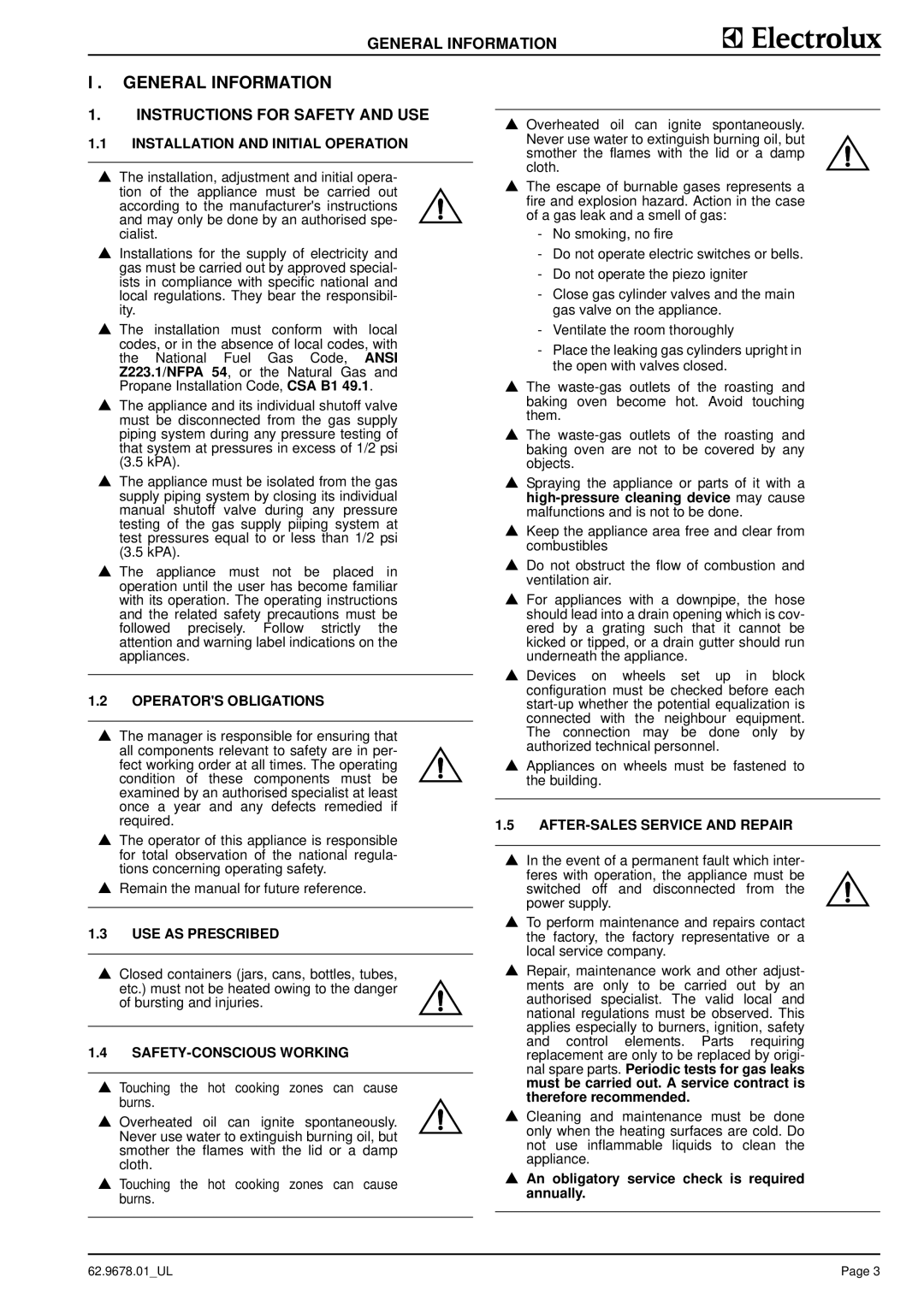
GENERAL INFORMATION
I . GENERAL INFORMATION
1.INSTRUCTIONS FOR SAFETY AND USE
1.1INSTALLATION AND INITIAL OPERATION
SThe installation, adjustment and initial opera-
tion of the appliance must be carried out according to the manufacturer's instructions and may only be done by an authorised spe- cialist.
SInstallations for the supply of electricity and gas must be carried out by approved special- ists in compliance with specific national and local regulations. They bear the responsibil- ity.
SThe installation must conform with local codes, or in the absence of local codes, with the National Fuel Gas Code, ANSI Z223.1/NFPA 54, or the Natural Gas and Propane Installation Code, CSA B1 49.1.
SThe appliance and its individual shutoff valve must be disconnected from the gas supply piping system during any pressure testing of that system at pressures in excess of 1/2 psi (3.5 kPA).
SThe appliance must be isolated from the gas supply piping system by closing its individual manual shutoff valve during any pressure testing of the gas supply piiping system at test pressures equal to or less than 1/2 psi (3.5 kPA).
SThe appliance must not be placed in operation until the user has become familiar with its operation. The operating instructions and the related safety precautions must be followed precisely. Follow strictly the attention and warning label indications on the appliances.
1.2OPERATOR'S OBLIGATIONS
SThe manager is responsible for ensuring that
all components relevant to safety are in per- fect working order at all times. The operating condition of these components must be examined by an authorised specialist at least once a year and any defects remedied if required.
SThe operator of this appliance is responsible for total observation of the national regula- tions concerning operating safety.
SRemain the manual for future reference.
1.3USE AS PRESCRIBED
SClosed containers (jars, cans, bottles, tubes, etc.) must not be heated owing to the danger of bursting and injuries.
1.4SAFETY-CONSCIOUS WORKING
STouching the hot cooking zones can cause burns.
S Overheated oil can ignite spontaneously. Never use water to extinguish burning oil, but smother the flames with the lid or a damp cloth.
STouching the hot cooking zones can cause burns.
SOverheated oil can ignite spontaneously. Never use water to extinguish burning oil, but smother the flames with the lid or a damp cloth.
SThe escape of burnable gases represents a fire and explosion hazard. Action in the case of a gas leak and a smell of gas:
-No smoking, no fire
-Do not operate electric switches or bells.
-Do not operate the piezo igniter
-Close gas cylinder valves and the main gas valve on the appliance.
-Ventilate the room thoroughly
-Place the leaking gas cylinders upright in the open with valves closed.
SThe
SThe
SSpraying the appliance or parts of it with a
SKeep the appliance area free and clear from combustibles
SDo not obstruct the flow of combustion and ventilation air.
SFor appliances with a downpipe, the hose should lead into a drain opening which is cov- ered by a grating such that it cannot be kicked or tipped, or a drain gutter should run underneath the appliance.
SDevices on wheels set up in block configuration must be checked before each
SAppliances on wheels must be fastened to the building.
1.5AFTER-SALES SERVICE AND REPAIR
SIn the event of a permanent fault which inter- feres with operation, the appliance must be switched off and disconnected from the power supply.
STo perform maintenance and repairs contact the factory, the factory representative or a local service company.
SRepair, maintenance work and other adjust- ments are only to be carried out by an authorised specialist. The valid local and national regulations must be observed. This applies especially to burners, ignition, safety and control elements. Parts requiring replacement are only to be replaced by origi- nal spare parts. Periodic tests for gas leaks must be carried out. A service contract is therefore recommended.
SCleaning and maintenance must be done only when the heating surfaces are cold. Do not use inflammable liquids to clean the appliance.
SAn obligatory service check is required annually.
62.9678.01_UL | Page 3 |
